Ditapis dengan
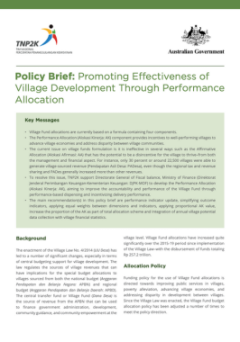
Policy Brief: Promoting Effectiveness of Village Development Through Performa…
The enactment of the Village Law No. 4/2014 (UU Desa) has led to a number of significant changes, especially in terms of central budgeting support for village development. The law regulates the sources of village revenues that can have implications for the special budget allocations to villages sourced from both the national budget (Anggaran Pendapatan dan Belanja Negara: APBN) and regional bud…
- Edisi
- 1
- ISBN/ISSN
- -
- Deskripsi Fisik
- PDF, 12 Halaman
- Judul Seri
- Policy Brief
- No. Panggil
- 352.54 ADJ.P
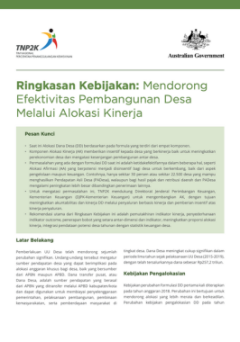
Ringkasan Kebijakan: Mendorong Efektivitas Pembangunan Desa Melalui Alokasi K…
Pemberlakuan UU Desa telah mendorong sejumlah perubahan signifikan. Undang-undang tersebut mengatur sumber pendapatan desa yang dapat berimplikasi pada alokasi anggaran khusus bagi desa, baik yang bersumber dari APBN maupun APBD. Dana transfer pusat, atau Dana Desa, adalah sumber pendapatan yang berasal dari APBN yang ditransfer melalui APBD kabupaten/kota dan dapat digunakan untuk membiayai pe…
- Edisi
- -
- ISBN/ISSN
- -
- Deskripsi Fisik
- PDF, 12 Halaman
- Judul Seri
- Policy Brief
- No. Panggil
- 352.54 ADJ.R
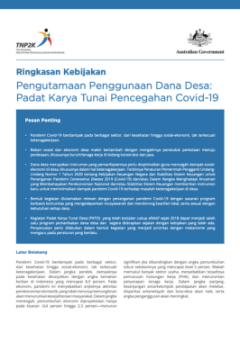
Ringkasan Kebijakan Pengutamaan Penggunaan Dana Desa: Padat Karya Tunai Pence…
Pandemi Covid-19 berdampak pada berbagai sektor, dari kesehatan hingga sosial-ekonomi, tak terkecuali ketenagakerjaan. Dalam jangka pendek, dampaknya pada kesehatan ditunjukkan dengan angka kematian korban di Indonesia yang mencapai 8,9 persen. Pada ekonomi, pandemi ini menyebabkan anjloknya aktivitas perekonomian domestik, yang tidak menutup kemungkinan akan menurunkan kesejahteraan masyarakat…
- Edisi
- 1
- ISBN/ISSN
- -
- Deskripsi Fisik
- PDF, 8 Halaman
- Judul Seri
- Policy Brief
- No. Panggil
- 352.54 ASM.R
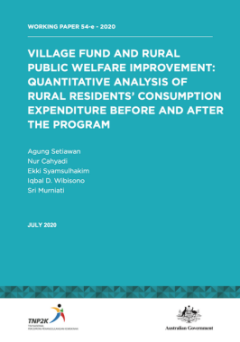
Village Fund And Rural Public Welfare Improvement: Quantitative Analysis of R…
The main finding of this study indicates that the Village Fund program has caused an increase in rural residents’ per capita expenditure. This study also finds that the magnitude of this increase in per capita expenditure varies by regional characteristics. Firstly, per capita expenditure in areas having good infrastructure is higher compared to per capita expenditure in areas having poorer i…
- Edisi
- Working Paper 54-e - 2020
- ISBN/ISSN
- -
- Deskripsi Fisik
- PDF, 20 Halaman
- Judul Seri
- Working Paper
- No. Panggil
- 307.72 SET. V
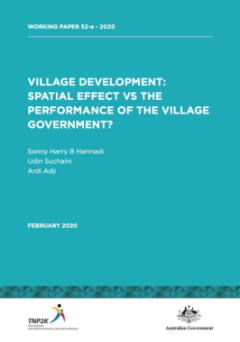
Village Development: Spatial Effect Vs The Performance Of The Village Governm…
Village funding in the amount of Rp 257.2 trillion in the past five years (2015-2019) uses a scheme that shares funding equitably. This is evident from the proportion of village funds (90 percent) that was divided equally (2015-2017) (Ministry of Finance, November 2017). This study aims to prove that the achievements of village development are not only due to the impact of the Village Fund Prog…
- Edisi
- Working Paper 52-e - 2020
- ISBN/ISSN
- -
- Deskripsi Fisik
- PDF, 38 Halaman
- Judul Seri
- Working Paper
- No. Panggil
- 307.72 HAR. V
 Karya Umum
Karya Umum  Filsafat
Filsafat  Agama
Agama  Ilmu-ilmu Sosial
Ilmu-ilmu Sosial  Bahasa
Bahasa  Ilmu-ilmu Murni
Ilmu-ilmu Murni  Ilmu-ilmu Terapan
Ilmu-ilmu Terapan  Kesenian, Hiburan, dan Olahraga
Kesenian, Hiburan, dan Olahraga  Kesusastraan
Kesusastraan  Geografi dan Sejarah
Geografi dan Sejarah